I did a lot of travelling when I was in my 20s and I kept diaries for many years. Now, in my 40s, I am able to publish these diary travelogues on the blockchain and it's great fun revisiting the past in this manner and sharing my journeys.
What I'd like to present here is a series of four posts documenting my journey down the Nile, from Cairo to Lake Nasser and back, in April 1996.
In 1995, half-way through a degree in Modern Languages (one of which was Arabic) I decided to take a year out and go traveling. I spent some months in India, and then flew to Cairo in November 1995. I stayed there for three months and then taught English for a couple of months in a village called Basaisa, in the Nile Delta region North of Cairo. In April I set off to follow the Nile South, initially wanting to go all the way to Khartoum. That had to be abandoned due to the political situation between Egypt and Sudan - closed borders! I didn't have much of a plan as such. I wanted to follow the Nile down as far as I could, and to see some of the lesser known Pharaonic remains along the way. I was not quite 24 at the time.
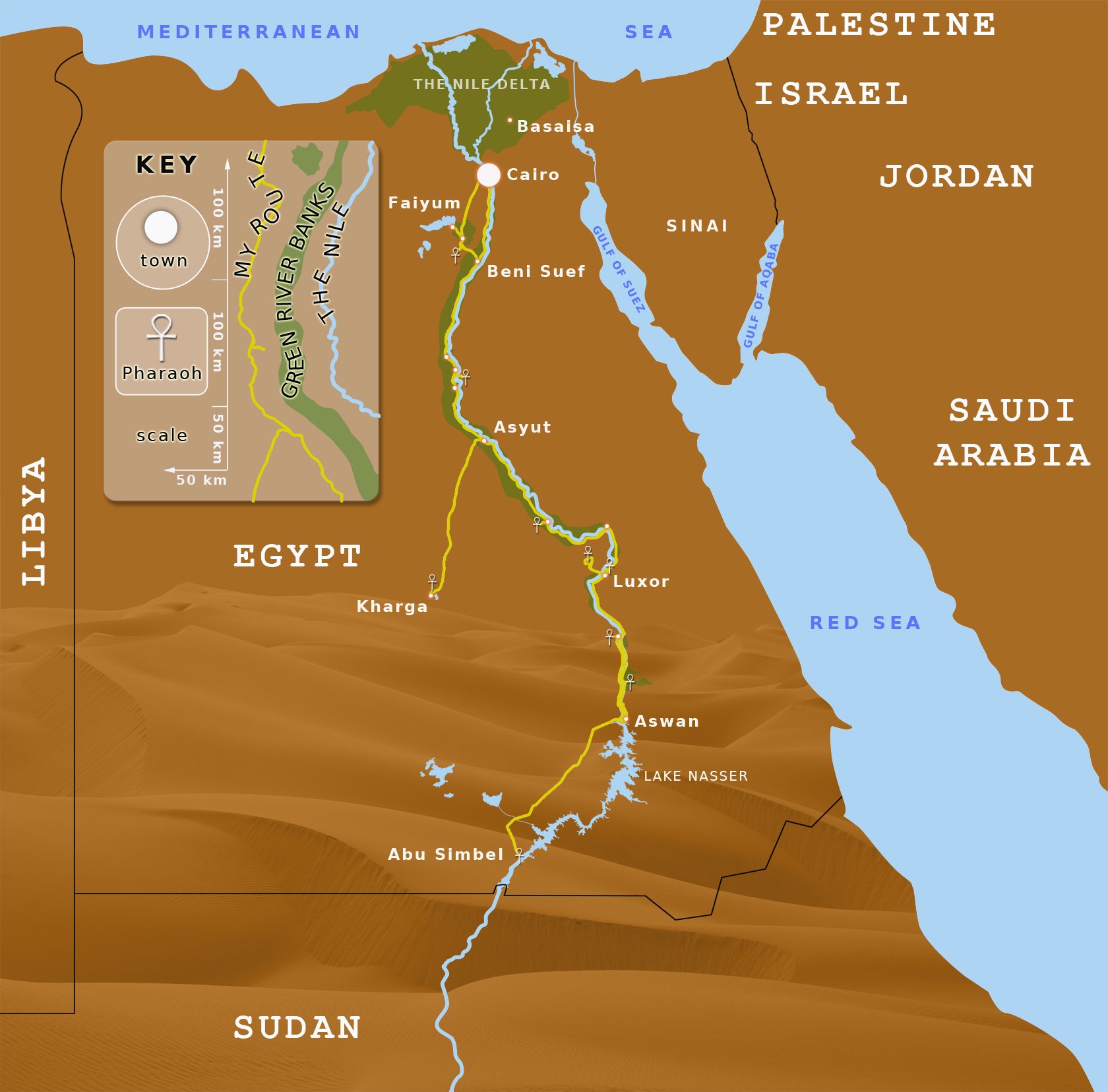
Although I do not carry a camera with me on these travels, there is plenty of available in-context visual material online which I have made use of. I have sized the images to a width of 1680 pixels, so if you'd like to zoom in, you can use the right-click (CTR-click) options to 'view image' for more detail. Rather than intervene in the narrative with present day thoughts or explanations, I have added footnotes where appropriate.
The narrative picks up as I am leaving Cairo on Monday 8 April, 1996, and heading South-West to the oasis of Faiyum.
Thanks for reading
🚣
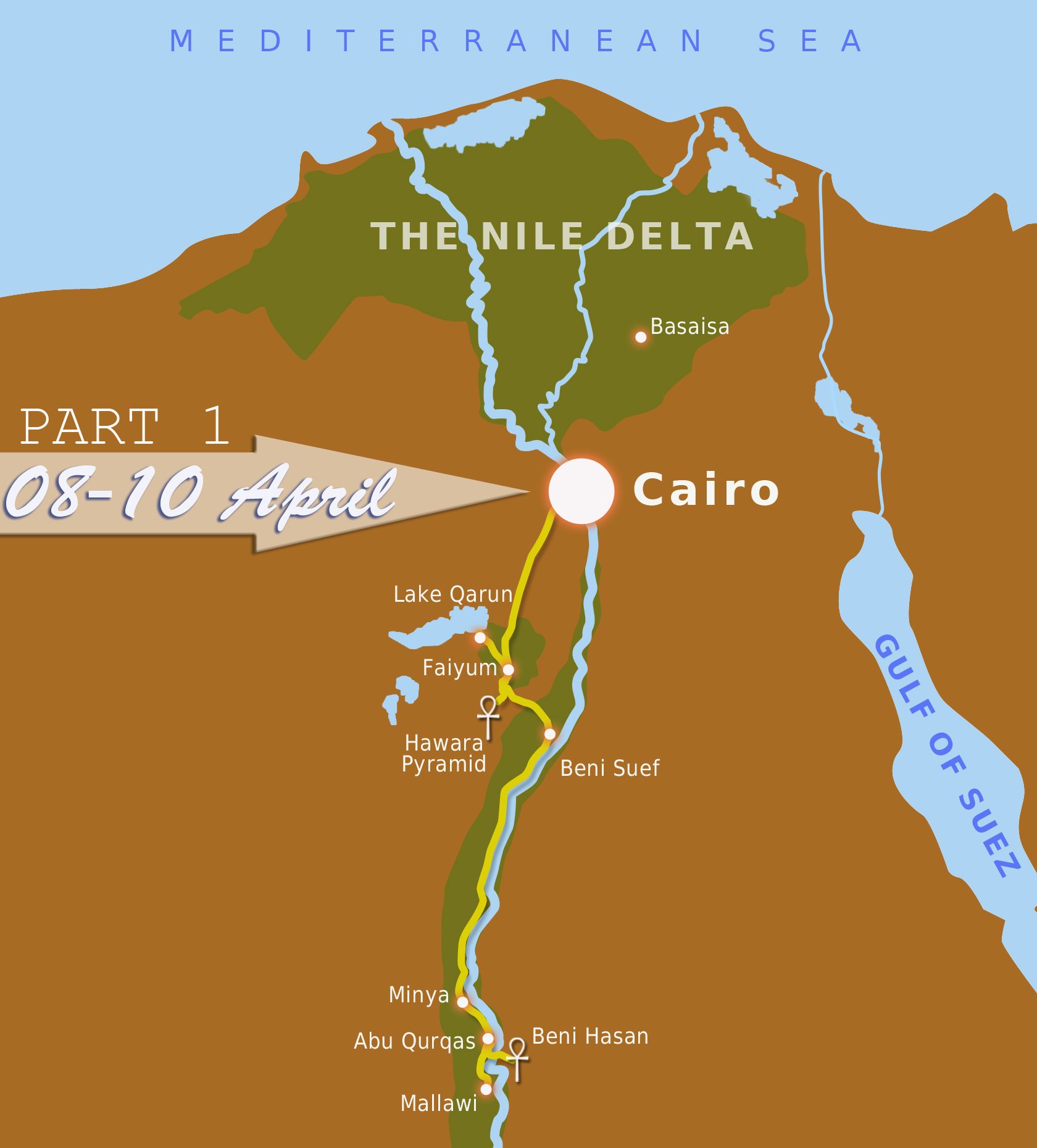
Monday, 8 April | 18.50 | Lake Qarun, Faiyum Oasis
I like it here in Oasis of Faiyum.
Yesterday in Cairo, after saying goodbye to Ibrahim and Nariman, I went to the Mogamma1 to have my Egyptian visa transferred onto my new passport. I got it sorted after some to-ing and fro-ing and I then caught a minibus to Faiyum, an hour and a half South-West of Cairo. I enjoyed the trip, dozy and pleasant. Left my stuff at Michael's hotel, where I had arranged to meet him later, and where he said I could share the room, which his company was paying for anyway.
Then I went for a walk on the outskirts of the town. I walked through fields, very like the Delta2 except that there is a greater variety of crops here. At one stage I came upon a picturesque old water wheel. A little later, two elderly men called out to me from the other side of the little river where they were sitting in a beautiful little enclosure. They sent a lad to bring me across in the little boat which was maneuvered by means of a washing line strung across the stream. Sat with them for a while, smoking, talking and drinking tea.
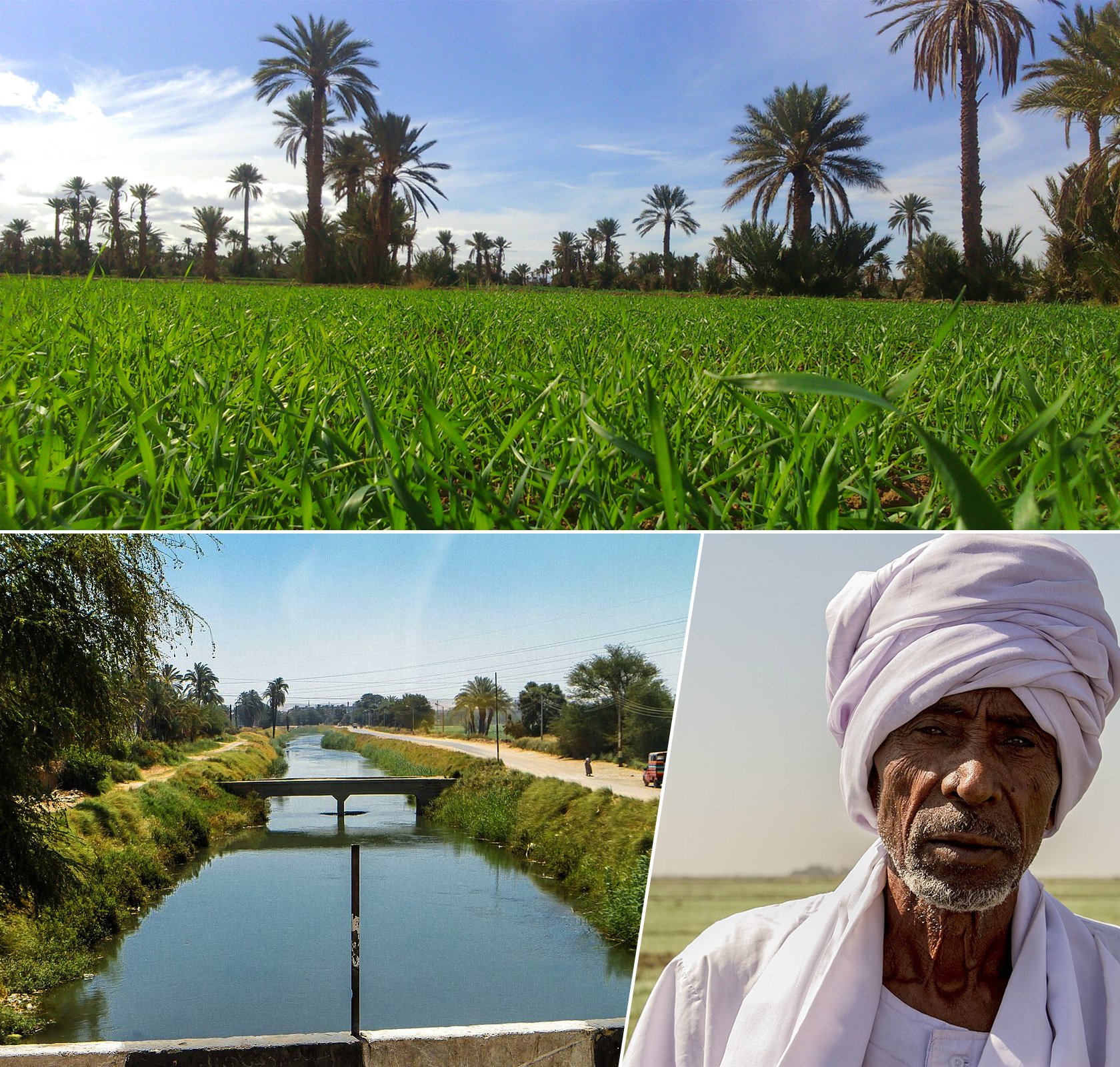
When I got back, I met up with Michael and Suzie,an old friend of his from the States, on holiday with her two children. Also Reg, who is teaching here and doing a PHD on Black American Women Writers of the 19th century, interesting! We walked around for a while and when I returned with Michael, got stoned and had a good long chat with him. I also showed him the report I had written on the experience of teaching English in Basaisa village, which he thought was excellent. He suggested I write.
This morning I went along to Reg's house and talked with her for a while before going to the University where Michael teaches, and saying goodbye. Caught the minibus to the lake and got here around 16.15.
I had a funny experience which was also exasperating. I got off the bus at Qarun and was directed to a house where they said I could get a room – actually it was a whole flat to myself! Bargained from 20LE3 down to 10LE and smoked a fag with the man, who was elderly. Then, just as I was about to set off to catch the sunset from an attractive little green peninsula that I had spotted, he stated that he wanted me back before sunset. I protested, saying I wasn't a child etc, but he insisted, saying he would be worried, that it was his responsibility etc. We eventually reached an agreement and walked downstairs, but he then wanted to add the condition that he accompany me. He didn't want anything as such, and had offered me my money back 2 or 3 times before I gave up. I told him that I had long since stopped pissing in my undies, collected my stuff and my money and left after shaking hands. He seemed concerned but I do not know why4.
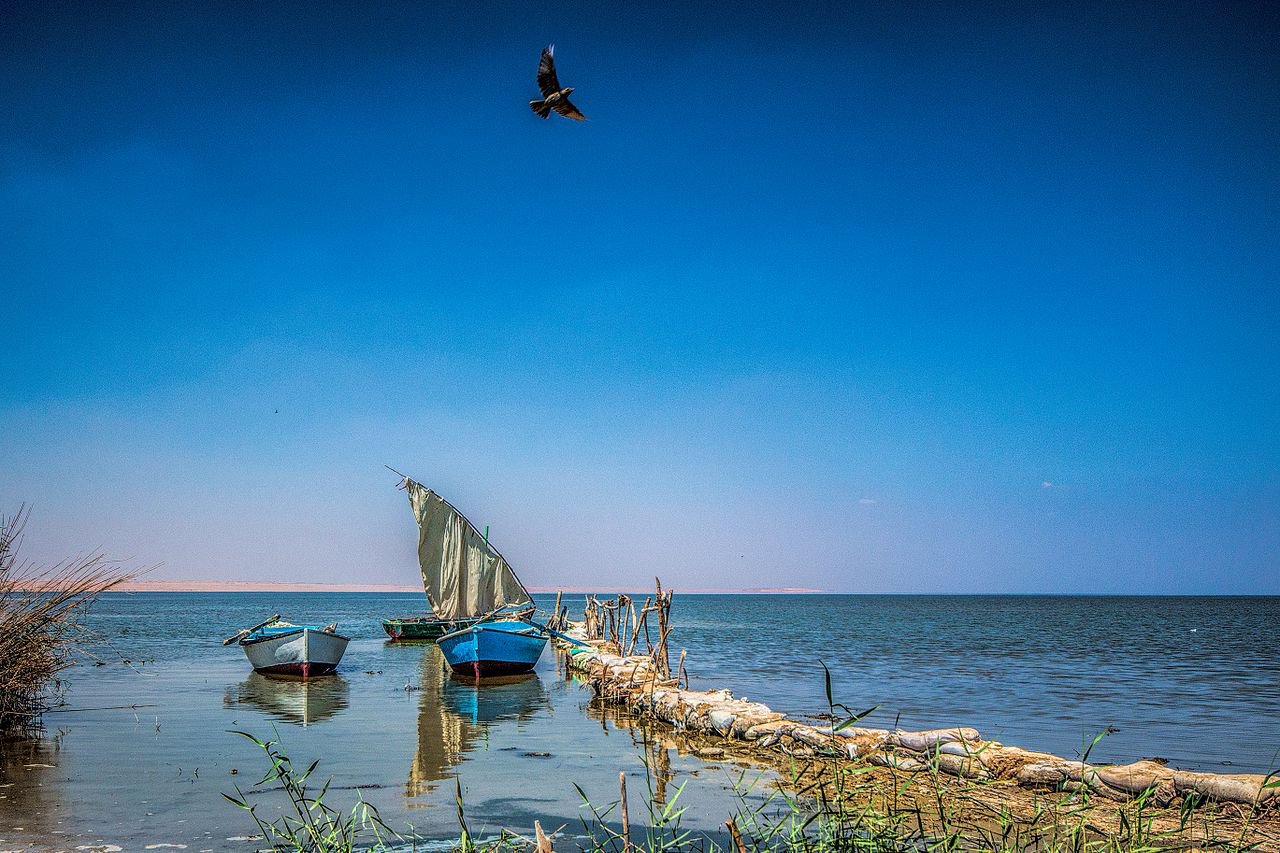
There aren't many buildings and no tourists as yet. Found an upmarket-ish place with very nice people, and got it down from 30LE to 20LE for the night. I finally got to walk along my peninsula, with some kids following me. Told them they'd get some baksheesh when I returned. Smoked a joint in the dying red sunlight. I could see the other side of the lake and the desert and the hills. On the way back four of the kids caught up with me and accompanied me through the village – they got a sweet and a coin each. Of adults, I saw only young women and just one farmer. Nice here, going to go out for some food now.
1. Mogamma: The 'complex' of Egyptian government administratoin.
2. The Nile Delta region, North of Cairo, where I had taught English in a village called Basaisa for a few months immediately prior to this.
3. LE = Egyptian Pound. At the time £1 Sterling was roughly 5LE
4. The Egyptian government was very sensitive at the time about safety of foreign tourists (protecting the industry from 'terrorism'). I encounter this in a much bigger way later on in the narrative. Here the old man was probably paranoid that something would happen to me which he would then be held responsible for.
Tuesday, 9 April | 15.05 | Top of Hawara Pyramid
I realise what good training living in Basaisa has been, for I am now used to dealing with Egyptian villagers and, to an extent, know something of their ways. This makes me less self-conscious and it is easier to get on with them.
Woke up around 10.30 and into Faiyum by 12.15. Got a minibus out to Hawara village. Someone accompanied me to a shop where I could leave my backpack and I had a cola there. Then I walked (alone thankfully) 4-5 km along a circuitous connection of roads to the 4000-year old, 58 meter high pyramid.
It is very green here. There is a narrow strip of vegetation connection Faiyum to the Nile. The desert is all around with the oasis stretching out behind. I loved the walk and was thinking how wonderful it is to be alone and to come across remains of antiquity, sleepy villagers and their plodding donkeys.
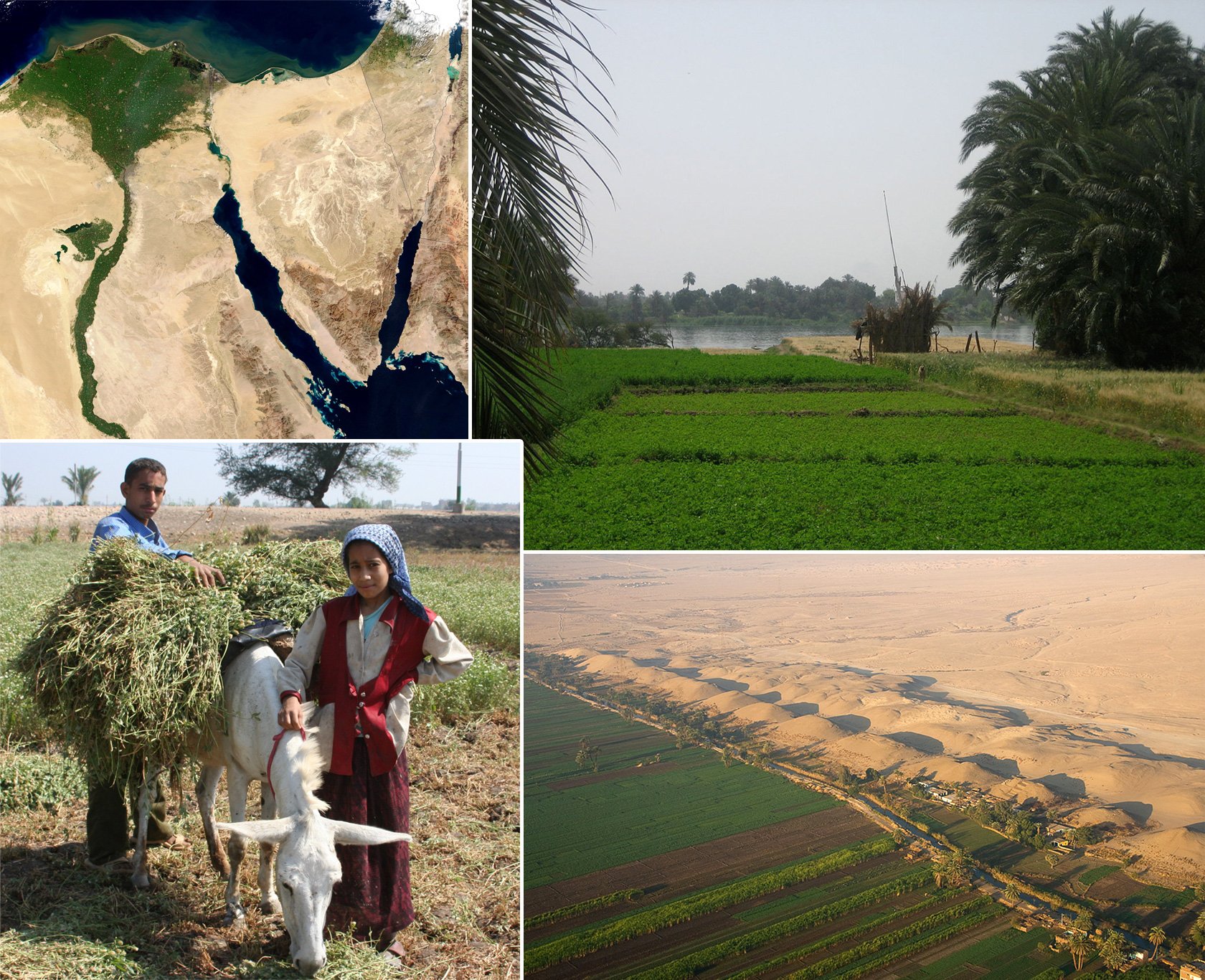
However, there is a road leading up from the other side and a presently a man appeared insisting that I go to the 'booth' and buy a ticket. I protested, but finally paid 4LE on the assumption that I'd at least get to see the interior. A guard accompanied me and along the way I observed him pick up a stone and wondered what it was for. He chucked the stone, it descended 10-20 meters and then went 'plop' – the place full of water so I can't go in! I gave him 1LE, he offered me a fag and I climbed up the outside of the pyramid instead. So it's not too bad at all!
I can see another pyramid - Lahoun apparently, 10 km away. Might stop on my way to Beni Suef, or might just carry on to Minya.
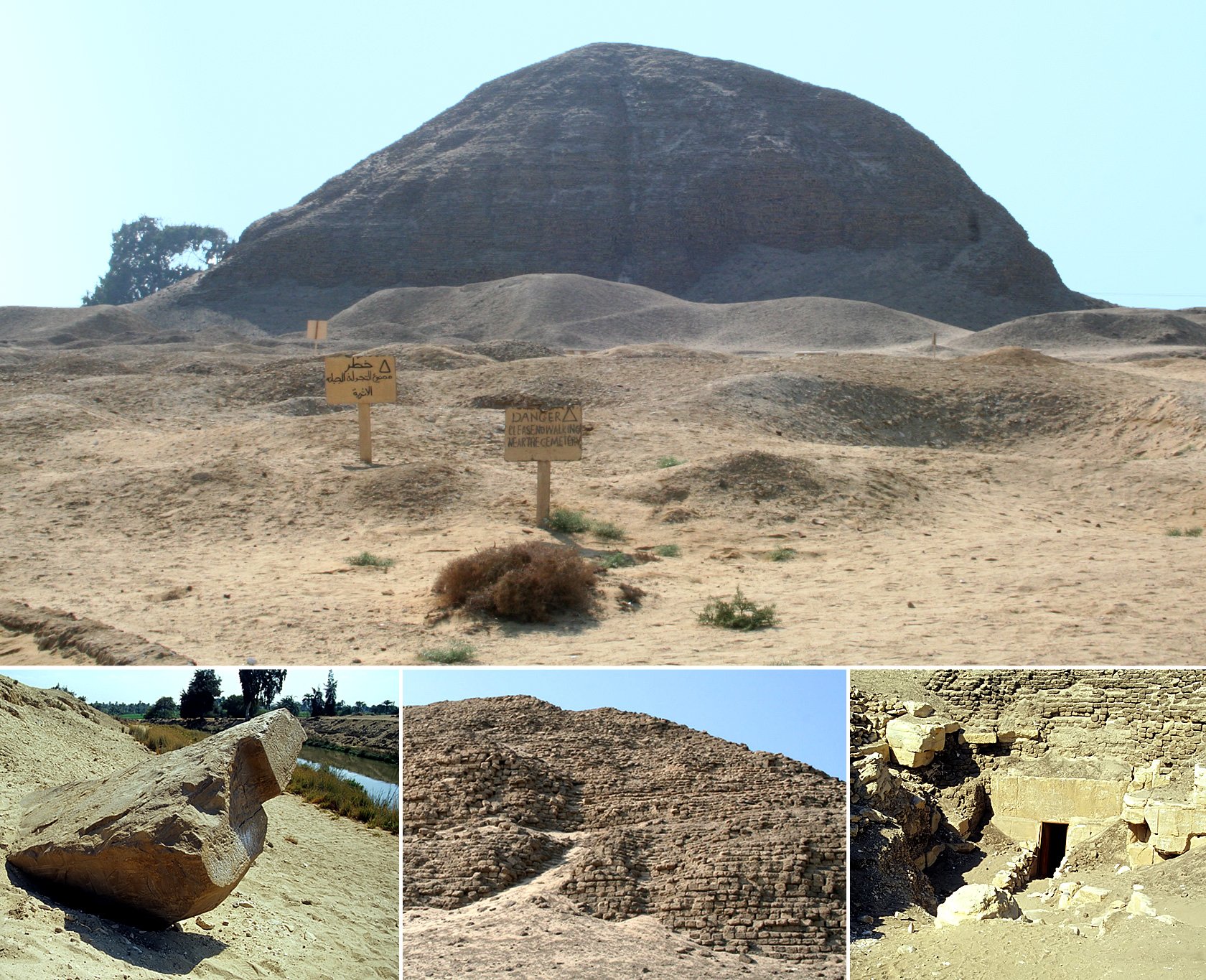
...later | 18.30 | Train Beni Suef to Minya
A flurry of movement and jumping from one mode of transport to another. Climbed down from the pyramid and cracked a joke with the guard (who had 'ensnared' a couple of Western tourists) about it being forbidden (ممنوع) to climb the pyramid in case it collapsed.
Walked back to the village through the fields and had another coke. Collected my bag and walked onto the road to Beni Suef. Stood on the back step of a van for 10 km to Lahuna. Was surprised to see a woman suckling a baby via a big breast, totally unconcerned and unselfconscious. Got a bus to Beni Suef almost immediately and an undercover policeman from Faiyum showed me to the train station, where I boarded a train to Minya within 10 minutes.
I wasn't sure what kind of ticket I had bought and had assumed it was 2nd class. However, a couple of students I was talking to insisted it was a 1st class ticket. So I went along and sat down beside 3 men, 2 of whom were engine drivers for the railway and had a live crab trapped in a bottle. The third was a reticent fellow. The conductor was polite and said I should go to the carriage next door, which also looks 1st, but may be not be. The carriage is mostly empty and the seats are comfy. Perhaps I'll be moved on again! 2 hours to Minya.
I've been speaking lots of Arabic and am pleased with myself and the freedom and spontaneity on offer. Might spend a couple of days in Minya and see the Pharaonic remains nearby.
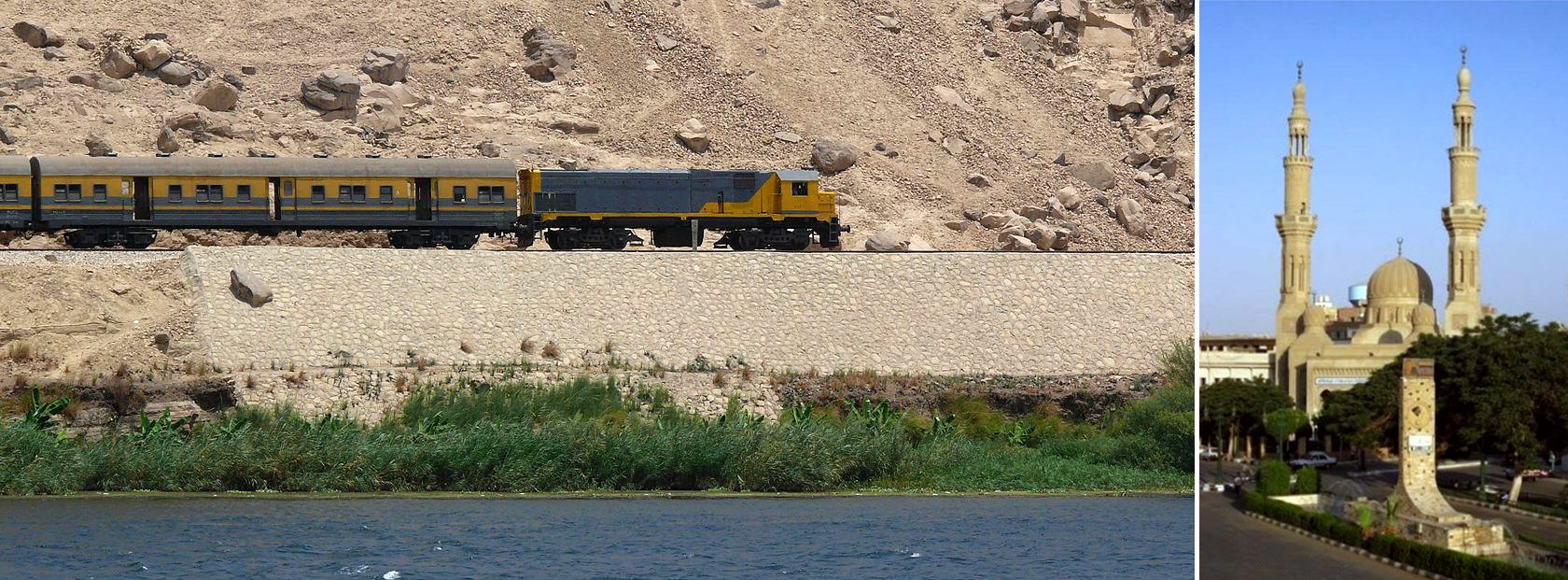
Wednesday, 10 April | 18.50 | Train Minya to Mallawi
I seem to have had quite a bit to do with the Egyptian Tourist Police – a kind of flirtatious relationship! Although in the end I got to like most of them, I wasn't quite sure what to make of it all.
It basically started yesterday in Minya. I paid 15.25LE to stay at the Beach Hotel. I got stoned and wandered around town for 3 hours until midnight. Talked for an hour and a half on my return with two of the hotel staff and two tourist policemen (TPs). They were very friendly and appeared interested in my life. I had mentioned wanting to go to Beni Hasan the next day and from what I gathered, they were very concerned for my safety and their 'responsibility' for it. They said something about someone accompanying me.
I obviously did not want that, but when I left at 10.30 this morning, there was a TP who had been waiting since 8.45am. He took me along to the minibus stop and noted down the name of the driver and the registration plate of the vehicle. When I returned from Beni Hasan at around 17.30, I went to the hotel to collect my backpack and go to the station. Again they insisted on sending someone with me who would take the driver and vehicle details if I were to go by minibus.
This time I kicked up a fuss. There was a flurry of telephone calls and a lot of what seemed to be nonsense spoken about my safety. I finally got them to let me walk the few hundred meters to the train station alone. I stopped on the way for some juice and when I emerged, I found a man waiting outside. I just accepted it and walked alongside my bodyguard. He led me to the tourist office at the station, where there were 2 or 3 other TPs sitting. All of them were at least aware of my existence and produced all sorts of incomprehensible reasons against my going to Mallawi – apparently I had to get permission from the police there! I actually really enjoyed talking to them for it was a very light atmosphere and all very conversational. They saw me onto the train at 18.30.
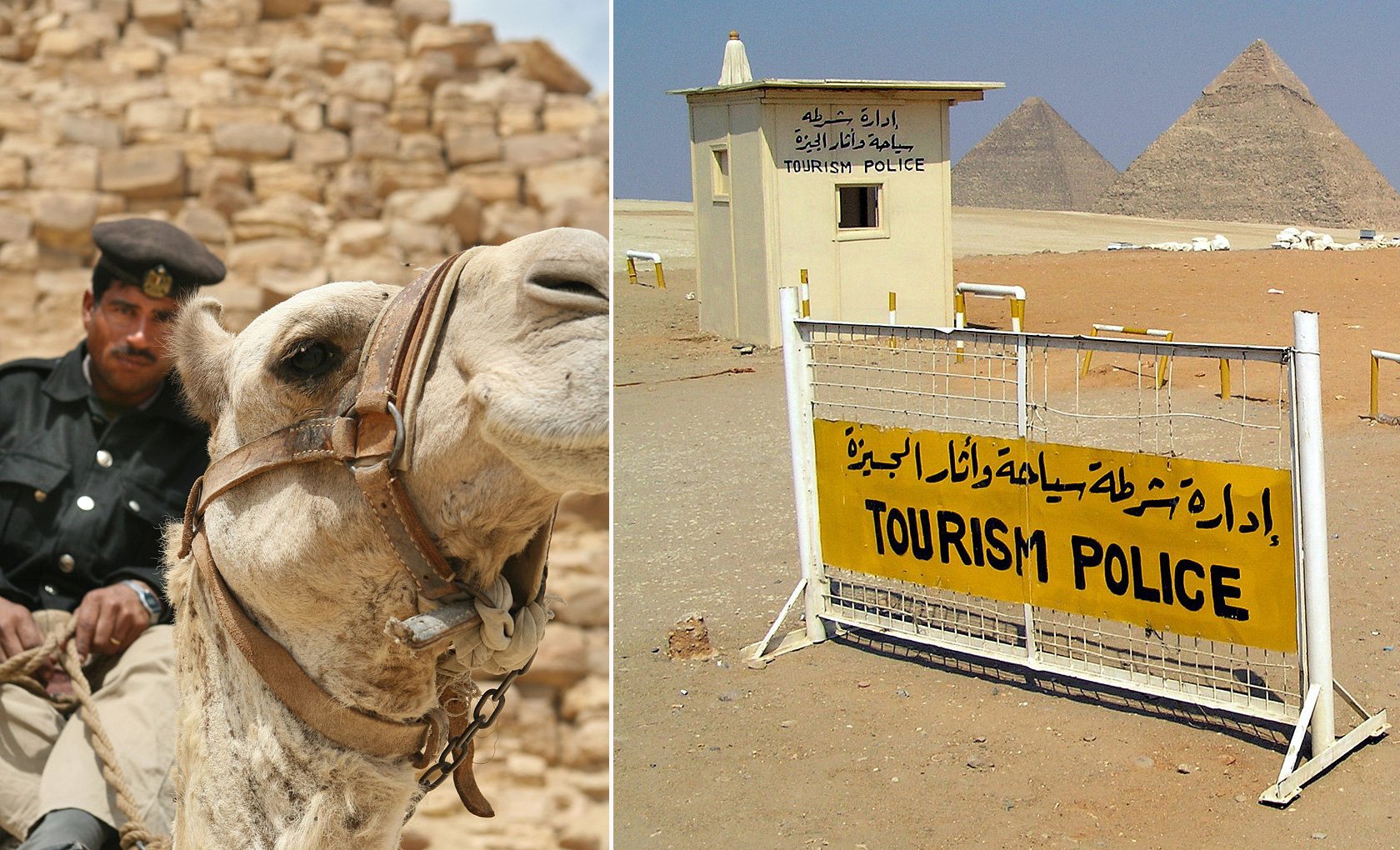
…later | 20.05 | Mallawi
The previous entry was interrupted by the train's arrival at Mallawi, and some interesting new developments.
The police had obviously been forewarned of the foreigner's arrival in their terrorist-ridden city, for I hadn't walked 15 meters from the station when an armed guard came running up to me urging me towards a young man with a walkie-talkie. He kept saying that there was no danger whatsoever, but nonetheless I had to be accompanied to the hotel, for which purpose a minibus was being sent. This turned out to be what seemed to be the chief's jeep – very posh, with air-conditioning and bullet-proof windows. There were three armed guards, the chief himself, and the driver. We had 4 machine guns sticking out of special sockets in the windows. I was in a light-hearted mood and they kept saying 'no danger/problem' ( مش مشكلة) which I found hilarious.
My armed escort dropped me off at the hotel Semir Amis. I paid 5.50LE and was taken to my room where I discovered myself to be virtually a prisoner. I can't leave because, as the hotel-guy told me, “it is dangerous for a foreigner”. Even Tuna El-Gebel, the Pharaonic remains I had intended visiting tomorrow are 'forbidden' (ممنوع) because the 'fundamentalists' might be about. Useless arguing with him about my freedom of movement as he is probably under orders from the police.
The whole thing is ridiculous, but I'm not irritated, it's an interesting experience even if farcical. I imagine this is a result of the tightening up on tourist security which took place a year or so ago, and although mostly obsolete, is still intact due to Cairo's fear of scaring away tourists and losing income. Who knows, there may be terrorist activity too1. The man said I'd be allowed to visit another site called Tel El-Amara, which is on the other side of the Nile and further South, but with a police escort! Apparently the TP are due to pay me a visit later tonight. I'd actually benefit from an enforced escort to Tel El-Amara, which I hadn't planned to visit. It's a large area and besides it should be free.
Ok, back to today's visit to Beni Hasan, 25km South of Minya, a 3500-year old necropolis on the East bank of the Nile.
I got to Abu Qurqas and walked 3 or 4km to the Nile. Had to wait an hour or so for the boat across, but it was very pleasant sitting in the sun with my feet in the water; ahead of the me the green, blue and brown of the grass, water and sand.
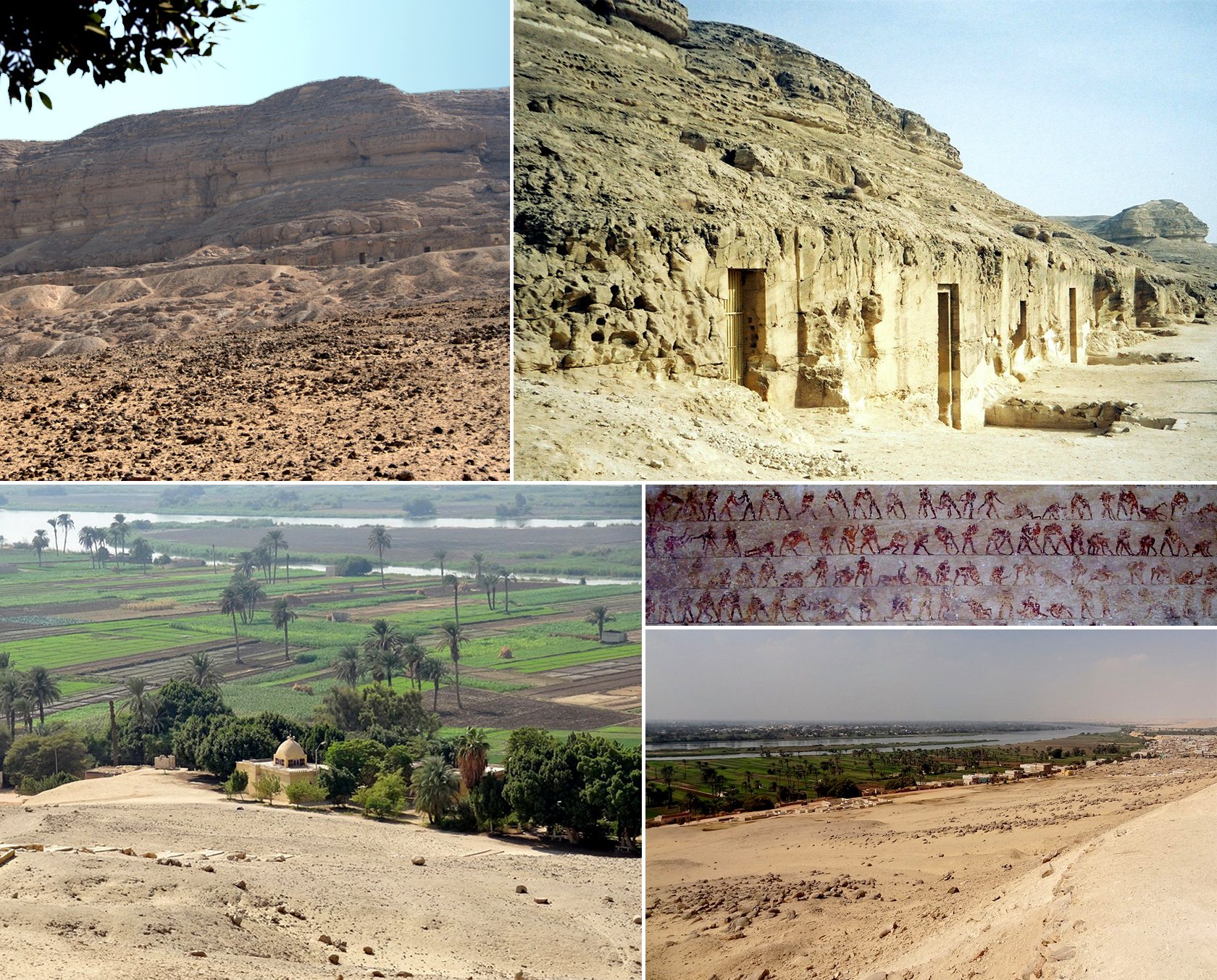
I was the only foreigner (hardly seen any others at all) and was accompanied by an armed TP guard and the man with the keys. Climbed up to the tombs and had an excellent view of the Nile and surrounding countryside. I only had an hour and a half before the boat went back and only four of the tombs were accessible. I got a bit annoyed with the TP trying to play the part of guide when I'd rather have had silence. As a result, I didn't get much of an 'atmosphere' hit. Stared at the paintings of the Pharaohs feasting and generally being absolutists, with animals, birds and other slaves around2.
There was lots and lots more, but it was either locked up or too far away for my 1.5 hours. Gave them 1LE each baksheesh and we all cheered up. I had a nice cup of tea, shisha3 and 20 minute chat with four of them when we got back to base. I walked back to the boat, which was waiting for me. I was 10 minutes late, but things like that don't count here.
I'm still experiencing this amazing friendliness everywhere. I'm able to loosen up with people, especially as I'm now communicating a lot more – if not in quality Arabic, at least in wider circles of repetition. All conversations are similar: Introduction – Religion – Marriage status – expansion of introduction.
Today is also my last day of bhangu4! Just smoked a joint, and have two more to go!
…later | 21.45 | Mallawi
Went to the restaurant downstairs, which is the only place I'm 'allowed' to go. Found that they've actually placed an armed guard outside the hotel door! I asked him and he confirmed that he was there because of me. I asked if any other foreigners had visited recently. They had indeed, and had similarly been put under guard. I asked if there had been any killings nearby – 'ages ago' (من زمان). It really seems strange, no recent incidents and all this good-natured paranoia. I'm not used to all this attention!
…later | 23.05 | Mallawi
Just heard on the BBC that the Egyptian police have arrested 240 odd Islamic 'fundamentalists' all around the country. So it must have been a big, planned operation and would explain the police presence and elaborate precautions! Wonder how many were arrested in this area and I wonder how many were real 'terrorists'.
1. On 18 April 1996, just a week later, an attack took place in Cairo. The targets however, were groups and not lone tourists like me. I never felt in any danger whatsoever and actually had youthful confidence (naivete?) that I could talk myself out of any situation.
2. My view of the time was that these monuments had been built on slavery by megalomaniacs. I combined that with my dislike of monarchy and authority. Now I think they are much more likely to have been constructed by benign ET thought energy than the blood and sweat of mass enslavement!
3. Shisha = Arabic water pipe
4. Bhangu = the name for grass (weed) in Egypt.



The Levant - 1996
Eastern Europe - 1994
